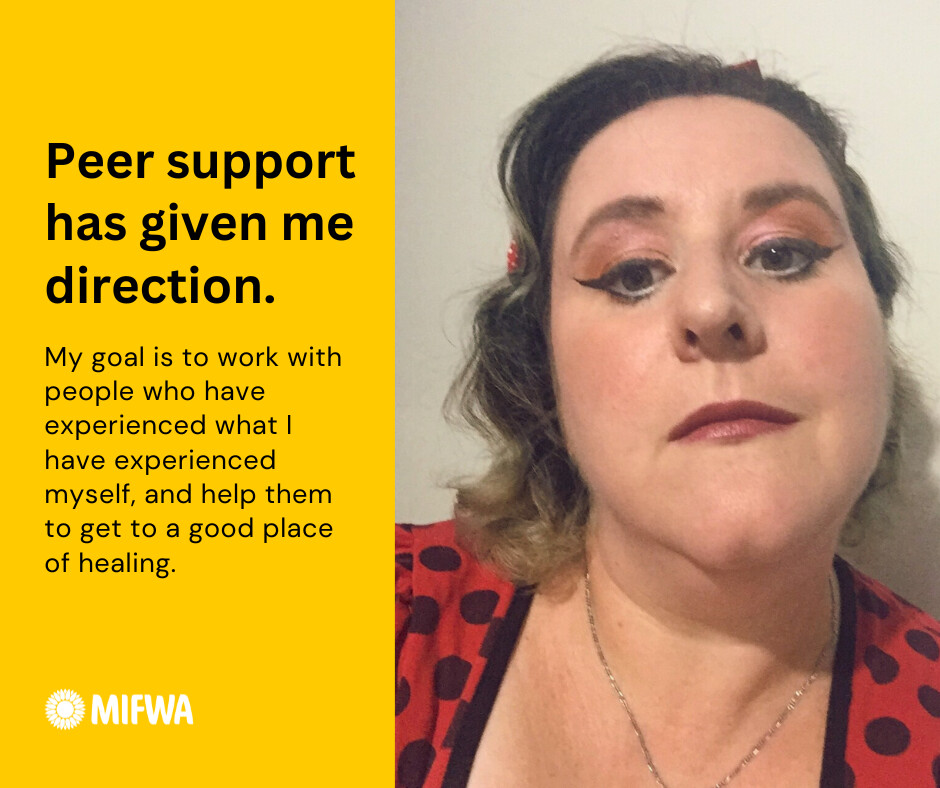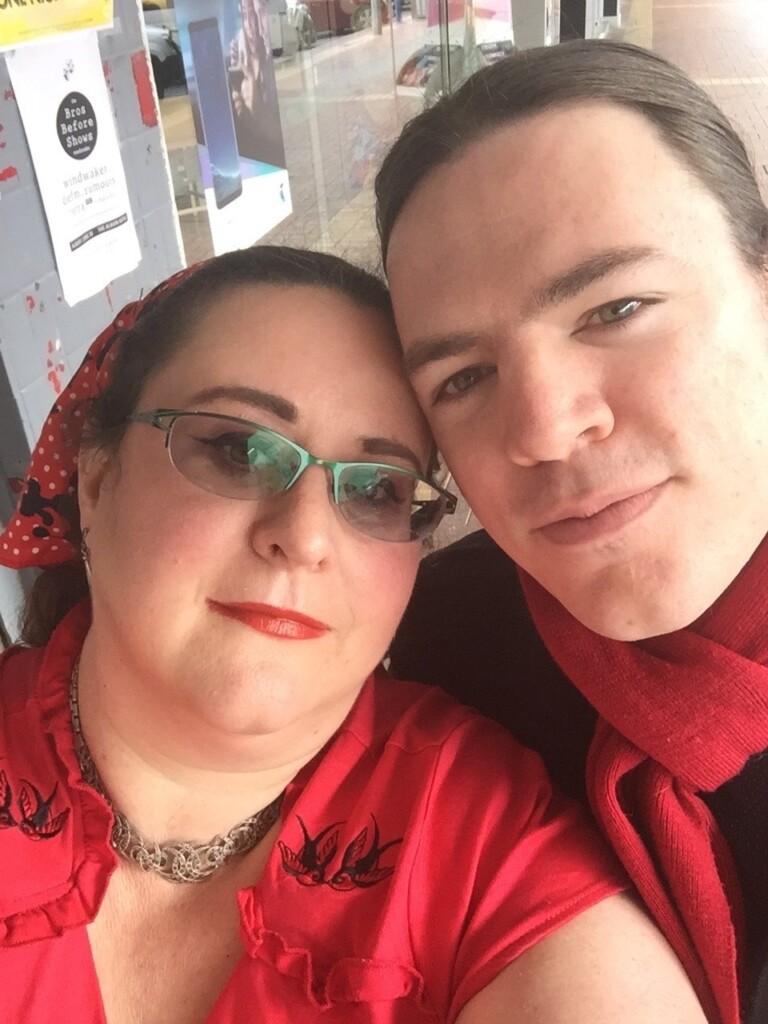
Marcia shares her experience of being supported by a peer worker through our Hospital to Home program.
I’m Marcia, mum to two awesome kids. I do craft including quilling, which is an old paper craft. I’m also a big nerd. I’m into a lot of movies, anime and games. That’s how I met my partner… playing games online.
In 2022, I was working at a call centre and the hours were really early. I was using energy drinks to try help me get through the day. This triggered a mania, because I’m bipolar, and I wasn’t sleeping. I didn’t sleep for a week, so I ended up in hospital for two weeks, getting treatment for the mania and trying to level everything out.
My Recovery Journey
When I was leaving the hospital, the psychiatrist recommended I get in touch with MIFWA for some extra support. I had heard of MIFWA before because someone I know does a lot with MIFWA. But I didn’t realise MIFWA did that kind of peer support.
I considered MIFWA as I wanted somebody outside of the home to talk to about my experiences with hospital and all that sort of stuff, because I didn’t want to burden my kids with that. And my partner has already been through my undiagnosed years and me trying to figure out medication and things like that. So, I wanted somebody outside the home just to talk to and bounce ideas off, and without overburdening my family. Because I feel like I put a lot on them sometimes. I wanted somebody neutral. I wanted Switzerland.
Hospital to Home peer support
Georgina came to my home to see if we’d be a good match, and we just had a chat then for about 30 to 45 minutes. We talked about what I expected from peer support and what I was going to be able to bring to it, and just a little bit about myself to see if we had similar sort of interests we could talk about. We figured out that Georgina would be a really good match to talk to, someone with really good energy. It was almost like speed dating! Just having someone that from the very start you know you have things in common with.
Peer support has since helped me with getting out of the house. I was wallowing a little bit in what had happened, and I was feeling so sorry for myself that I pretty much manufactured the mania myself by drinking the energy drinks and going into a job that was less than ideal.
Peer support helped me get myself of that bad headspace, and just get back to something normal again, like going out and having coffee with mates. It’s not something I’ve really experienced a lot since moving to Perth, because I haven’t really made a lot of good contacts here. In the four years or so that I’ve been here, I haven’t really made many good contacts. I only have a couple of people that I would call friends.
It was also good to have that escape from the house and to talk to Georgina about what was going through my head and just general stuff as well. Some days we just chatted about normal day-to-day stuff, what was going on and things like that, rather than my mental health challenges. Some days we only chatted about neutral matters and it was good to do that because I didn’t want to burden my husband. We do talk, we’ve got a really good relationship and everything like that, but I just needed somebody outside of everything to talk to and MIFWA provided that. And to get a few ideas about what I could do to take my recovery a bit further, and what I could do to help my own recovery.
I’m still able to talk to Georgina every now and then through messages. Georgina also supported me in my applications for doing peer support work with MIFWA. So, she’s helped me out with knowing who to contact for that. That’s fairly specific for somebody like me who wanted to actually come in and give back. But I feel if I’m going through something, I could reach out to Georgina and probably get back into a support program or something like that. I feel like that support is still there even though the official cut-off date for the Hospital to Home program and everything has ended. I feel like the support is still there.

Marcia with her partner Edwin
The biggest impact of peer support
It’s given me a career goal to go for. Because of the contact with MIFWA, I’m now studying mental health services at TAFE. My goal is to work with people who have experienced what I have experienced myself, and help them to get to a good place of healing.
I’ve been in hospitality for 30 years. It’s brutal on the body. It’s not great on the mind, and it’s really not great money. Peer support has given me direction that I didn’t have. I’ve tried to do FIFO work since I moved here. I tried to do call centre work. I was even looking into doing aged care and all that sort of thing, and just working for an organisation and just being a number.
I looked at all these sorts of different things and none of them spoke to me as something that I really wanted to continue doing. I couldn’t see myself doing them long term, whereas I could see myself doing mental health support long term.
One of the things I do in my own time is I’m a moderator on an online forum for over 200,000 people that have bipolar. A peer support forum. As moderators, we’re there to make sure it stays peer support and a safe space. Make sure nobody’s trying to give anybody medical information when they shouldn’t be. Things like that. So that’s something I’ve been doing for 10 years. I guess, in a way, I’ve been kind of heading towards doing peer support, but without really knowing what it was like face to face.
Being in contact with MIFWA, and making a speech just before Christmas, has really cemented in my mind what I want do. It’s given me something big to aim for.
The value of a peer worker
A good peer worker is a good listener, because a lot of it is about the participant talking. It’s not just about hearing it and having it go over your head. You’ve got to be able to listen, and take it in, and empathise with the participant. I also think a big thing is a sense of humour. Sometimes it helps the other person just to be able to have a bit of a laugh about the situation if they can, if they’re in that sort of headspace. And be able to talk to a wide variety of people.
You never know who you’re going to meet as your next peer support participant. It could be somebody that’s really religious and that might be something that’s strange for you, but you have to be able to listen and talk to them. It’s being able to connect with a wide variety of people.
Honestly, just give it a try, seek the support from a peer worker. Even if you only go for a couple of sessions and you find that you can’t, you don’t gel with that person or whatever, just give it a try. It’s half an hour or so out of your day. At your home or out of your home. You control the situation. You control where it happens. It’s you saying “Okay, I want to meet this person and talk to them. Just see see how they’ve coped with the stuff I’m going through”.
Get some ideas from somebody who isn’t a doctor, because it can sound high-handed when the information is coming from a medical professional. Whereas when it comes from a peer, it’s somebody just like you who’s been where you are. Give it a shot, and you’re not going to lose anything.
Peer support and TAFE
I’m honestly struggling in my head a little bit about going back to TAFE. I have to redo one of the modules that was really difficult, and we had a really bad teacher. I have to redo that module first up. That’s the only module I’ve got going in this term and is just this one thing that I’m not looking forward to. And my head is going “Don’t do it.”
Some support will get me through the tough parts of TAFE because I really want this, but I also know my self-talk could be loud. Just something to help me keep going for the goal. Keep going for the prize.
I’m happy that I got all the modules passed that I did. I got a heap done that I wasn’t sure if I was going to pass. I am on my way. I’m excited to get through and finish it and get back in touch with the other TAFE students, because some of them already work in the peer support space. So, I look forward to getting back into all of that and getting that finished this year so I can help people.
I’ve put in an expression of interest with MIFWA for the community mental health worker role. I’m excited about that and excited to get this course finished and get out there.
I’m also excited and proud to watch my daughters with their education journey. That makes me feel very happy inside. My youngest is in high school now, and she’s in the performing arts program at her school. So, she’s doing great there. My eldest daughter is in university doing computer science and games development. I could never have done STEM subjects, so it makes me proud.
I think my husband is happy that I’m a lot more ‘stable’ than I used to be. We used to fight a lot. He has said he’s really proud of how I’m doing with TAFE and how I’m just getting on the train every day, because I go to Joondalup from High Wycombe. So, he’s proud of me just getting up, getting out there, and getting on the train to go to TAFE every day and seeing how much I actually study at home. I feel very supported in that.
What does a Hospital to Home peer worker do?
A Hospital to Home peer worker is someone with lived experience of mental health challenges. They offer support over 8 weeks after a hospital stay, giving their participants a positive experience when returning home and to their daily lives and into the community. This support also helps to increase their wellbeing and reduce the rate of readmission.
Find our more here.
Share

